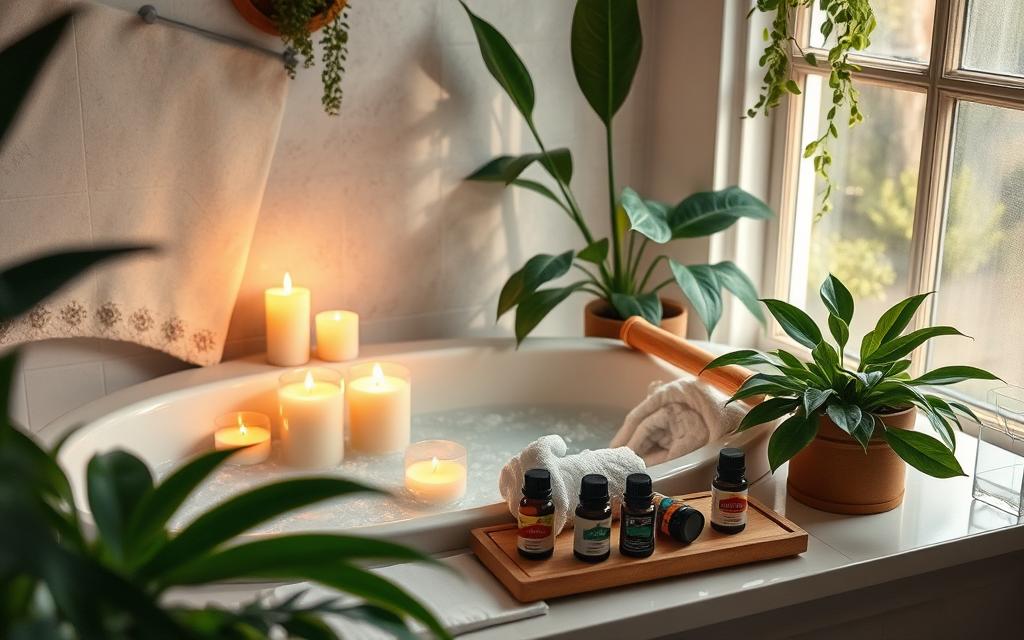Ever felt like you don’t belong in a room? That feeling of self-doubt can really hold you back. But, what if you could build self-confidence like any other skill? In this guide, we’ll share ways to boost your self-esteem and overcome insecurity.
Self-confidence is more than just a feeling. It affects every part of our lives. Studies show that confident people do better in school and work. They also feel better mentally.
So, if you struggle with feeling less than, or if you want to use your strengths more, this article is for you. It’s your guide to becoming more confident and empowered. Let’s start this journey of self-discovery and growth together. Get ready to find the self confidence tips that will change your life.
Understanding the Psychology of Self-Confidence
Self-confidence is key to personal growth and success. It’s built on self-trust and greatly affects our mental health. When we embrace our worth and see ourselves positively, we do better, bounce back stronger, and feel more fulfilled.
The Science Behind Self-Trust
Self-confidence starts with believing in our abilities and judgment. Positive self-talk is vital for this trust. By fighting off negative thoughts with positive affirmations, we build strong self-confidence.
How Confidence Impacts Mental Well-being
Confidence and mental health are closely tied. Feeling confident lets us take smart risks, share our thoughts clearly, and make choices that match our values. This boosts our happiness, improves relationships, and increases life satisfaction.
The Role of Self-Perception
How we see ourselves greatly affects our confidence. By having a balanced view of our strengths and weaknesses, we build self-worth. This self-awareness helps us set achievable goals, face challenges positively, and keep growing personally.
Breaking Free from Social Comparison
Chasing social approval and comparing ourselves to others can hold us back. Studies show that up to 80% of people feel less confident and happy because of it.
Practicing self-compassion can help fight these negative effects. By focusing on our own strengths and achievements, we can overcome insecurity and feel better about ourselves.
- A study in Personality and Individual Differences found a link between envy and lower self-esteem.
- Up to 70% of people compare their strengths to others’ weaknesses, leading to unfair self-assessment.
- As many as 90% of individuals make these unfair comparisons, making them feel worse about themselves.
To escape the cycle of comparison, we need to change our mindset. Keeping a gratitude journal can help us appreciate what we have instead of wanting what others have.

By accepting our flaws and celebrating our strengths, we build the strength to overcome insecurity. This way, we develop a strong, lasting sense of self-confidence.
Essential Self Confidence Tips for Daily Practice
Building self-confidence is a journey. Adding specific practices to your daily routine can make a big difference. From morning rituals to evening self-reflection, these tips can help you reach your full potential. They also help you celebrate small wins.
Morning Confidence Rituals
Begin your day with empowering affirmations and positive self-talk. Studies show that daily positive affirmations can boost self-esteem by 50% in three months. Engage in activities that lift your mood and energy, like exercise, meditation, or journaling. These morning routines can make your day confident and productive.
Evening Self-Reflection Exercises
- Reflect on your accomplishments, no matter how small. A study found that self-compassion can increase self-confidence by 43% in various life aspects.
- Identify areas for growth and plan to improve them. This growth mindset can raise self-confidence by 40% compared to a fixed mindset.
- Be thankful for your progress and the support of loved ones. Being around positive influences can boost self-confidence by 30%.
Building Momentum Through Small Wins
Celebrate your small wins and recognize your progress. Research shows that achieving small goals can increase self-confidence by 60% in a month. Acknowledging your victories, no matter how small, builds momentum and strengthens your self-belief. Studies also found that those who focus on self-improvement are 50% more likely to show increased self-confidence.
Adding these daily practices to your routine can change your journey towards greater self-confidence. Remember, self-confidence is a skill that grows over time. By investing in your personal growth, you’ll open up a world of possibilities.
The Power of Positive Self-Talk
Positive self-talk is a strong tool for boosting self-confidence and changing your life. It means swapping negative thoughts for positive, encouraging ones. These positive phrases help fight off negative thinking patterns.
When you face a big challenge, negative self-talk can stop you. For instance, thinking “I can’t handle this” might stop you from trying something new, like climbing Mount Kilimanjaro. But, positive self-talk can give you the courage to face your fears and reach your full potential.
Adding positive self-talk to your daily life can make you more confident and self-assured. Saying things like “I am capable of achieving my goals” or “I trust in my abilities” can boost your belief in yourself. This helps you overcome doubts and fears.
It’s important to notice your inner thoughts and challenge the negative ones. Swap “I’m not good enough” for “I’m doing the best I can.” Being consistent is key – start every day with positive affirmations to build a confident mindset.
Don’t compare yourself to others, as it often leads to negative self-talk. Instead, focus on your own growth and celebrate your achievements. Take care of yourself by exercising, eating well, and prioritizing your well-being. This supports positive self-talk.
Believe in yourself, trust your abilities, and see your strengths. The power of positive self-talk can change your life. It can help you see the world in a more positive light and build a strong, resilient mindset.

Transforming Your Self-Image Through Action
Building self-esteem and embracing your worth are key steps to change how you see yourself. Simple actions can greatly improve how you feel about yourself and show confidence to others. From how you stand to how you groom, these steps can deeply change how you see yourself.
Body Language Techniques
Your body language says a lot about your confidence. Standing up straight, making eye contact, and speaking clearly shows you’re sure of yourself. Using these techniques can help you build self-esteem and feel more powerful every day.
Dress for Success Strategies
What you wear can greatly affect how you feel about yourself. Wearing clothes that make you feel embraced for your worth, whether it’s a sharp suit or a stylish outfit, boosts your confidence. Dressing well is a powerful way to change how you see yourself.
Personal Grooming Impact
- Regular self-care, like good hygiene, can help you feel better about yourself.
- Spending time on grooming, like a fresh haircut or clean shave, makes you feel confident and worthy.
- Putting effort into grooming is a simple yet effective way to build self-esteem and look polished.
By adding these strategies to your daily life, you can slowly change how you see yourself. Remember, the journey to self-acceptance is personal, but the benefits of embracing your worth are huge.
Building Confidence Through Self-Care Practices
Self-care is a strong way to boost your self-confidence and well-being. When you focus on your health, you tell yourself and others that you embrace your worth. This boosts your self-esteem and confidence.
Regular exercise can improve how you see your body and boost confidence. A 2016 study showed that those who exercised often felt more confident and positive about themselves. Also, getting enough sleep and practicing mindfulness, like meditation, can make you feel mentally stronger and more self-trusting.

Self-care is more than just pampering. It’s a key investment in your well-being. By prioritizing self-compassion practices, you can overcome negative patterns, grow emotionally, and become more resilient. These are key for lasting confidence.
Doing things that make you feel good, like relaxing, doing creative hobbies, or being grateful, can greatly increase your self-worth. By taking care of yourself, you’ll be ready to face life’s challenges and go after your dreams with more self-confidence.
Overcoming Fear and Self-Doubt
Personal growth means facing our deepest fears and doubts. Self-doubt can be tough, but with the right mindset, you can beat it. You can learn to overcome insecurity and grow stronger.
Facing Your Fears Gradually
Building confidence is a step-by-step journey. Don’t tackle big fears right away. Start with small challenges and grow from there. This way, you build courage and trust in yourself.
Converting Anxiety into Action
Self-doubt can freeze you in place. But, you can turn that anxiety into action. Use a problem-solving mindset and take small steps, even when unsure.
Learning from Setbacks
Setbacks and failures are part of growth. Don’t beat yourself up over them. Instead, learn from them and use that knowledge to improve and grow stronger.
Remember, overcoming insecurity and growing is a journey. By facing fears, taking action, and learning from setbacks, you can change your life and reach your full potential.
Developing Strong Personal Boundaries
Setting and keeping personal boundaries is key to feeling confident and growing as a person. It means knowing your limits, telling others about them clearly, and making sure they respect those limits. Assertiveness training helps a lot in learning to set and keep healthy boundaries. This boosts your self-worth and personal growth mindset.
Albert Bandura (1977) said kids learn from seeing their caregivers set strong boundaries. People who grew up in a codependent home might struggle with self-identity or self-worth because of weak boundaries. It’s important to face and fix these issues to build self-respect and self-love.
- Setting personal boundaries is key for self-worth and self-love.
- Being consistent is crucial for setting and mastering personal boundaries.
- Talking about when boundaries are crossed is important. These talks should be firm but gentle.
Doing things that make you feel good, like singing or running, can help you feel more worthy. Setting boundaries also helps your mental health by reducing stress and protecting your mind from harm.

Different cultures have different views on personal boundaries. Some share personal info freely, while others see it as wrong. But, having healthy boundaries is vital. They help keep your mental and emotional space separate from others, preventing burnout.
The Connection Between Competence and Confidence
Competence and confidence go hand in hand, helping you grow and succeed. As you learn new skills, you start to believe in yourself more. This creates a cycle of growth. By adopting a personal growth mindset, you can boost both your skills and self-esteem. This unlocks your true potential.
Skill Development Strategy
Learning and improving your skills are key to building competence. Choose areas you care about and spend time getting better. As you master new skills, your confidence grows. This helps you face tougher challenges.
Knowledge Acquisition Methods
Getting knowledge is also vital for competence. Look for different learning sources, talk to experts, and dive deep into your interests. By learning more, you’ll feel more confident in using your new knowledge.
Remember, competence and confidence are not fixed; they grow with effort. Embrace the journey of learning and self-improvement. This way, a personal growth mindset can help you build self-esteem and excel in life.
Creating a Confidence-Boosting Environment
Building a space that boosts confidence is key. The people and places around us shape our thoughts and feelings. By creating an environment that supports positive self-talk and self-compassion practices, we can grow stronger.
Who we hang out with matters a lot. Being around people who uplift and believe in us can really help. Cutting out negative relationships and focusing on positive ones is a big step.
Our surroundings also play a role. A tidy, organized space can make us feel more in control. Adding things that make us happy, like art or quotes, can make our environment more supportive.
Creating a supportive environment is vital for building self-confidence. By building good relationships, keeping our space organized, and practicing positive self-talk and self-compassion practices, we can face challenges head-on. We can open up to new chances and change our lives for the better.
Mastering Professional Confidence
Building professional confidence is key for career success. It means improving your communication skills and showing leadership. By speaking clearly and using strong language, you can show you’re confident and competent at work.
Workplace Communication Skills
Good communication is the base of professional confidence. Assertiveness training helps you share your thoughts and needs clearly. It also boosts your confidence in speaking and presenting.
Leadership Presence Development
Having a strong leadership presence is vital for career growth. Using body language and looking professional shows you’re in charge. Taking on new challenges and learning new skills also helps you feel more confident and competent.
To master professional confidence, you need to improve your communication, leadership, and self-esteem. By working on these areas, you can open up new opportunities and reach your career goals.
Nurturing Authentic Self-Expression
Knowing your worth and growing personally are key to true self-confidence. Being true to yourself is at the core of this journey. By understanding yourself deeply and accepting who you are, you can make real connections with others. This boosts your sense of self, helping you feel more confident.
But, the journey to being true to yourself can be tough. Studies show that only 1 out of 2 women may not be completely happy with themselves, as Michelle Obama shared with Dr. Sharon Malone. The journey to self-esteem is ongoing, and it’s easy to get caught up in comparisons and doubt.
- Positive affirmations may not work for everyone, so using neutral self-talk can be a good alternative.
- Finding and acknowledging your strengths can be hard, as licensed psychologist Guy Winch notes.
- Learning to accept compliments gracefully can help build self-esteem over time, as National certified counselor Tanya Peterson suggests.
- Being on social media can affect self-esteem because of the idealized standards set by influencers, showing how social media can make us feel not good enough.
Authentic self-expression is a personal journey and a vital step in embracing your worth and cultivating a personal growth mindset. By standing up for your beliefs and showing others how to do the same, you can gain the confidence to be yourself fully.

Building Resilience for Lasting Confidence
Resilience is key to lasting confidence. By bouncing back from setbacks, people can grow stronger. They learn to celebrate small victories on their journey to self-improvement.
Bouncing Back from Setbacks
Resilience means bouncing back from tough times. When faced with challenges, resilient people learn from their mistakes. They stay positive and keep moving towards their goals.
This ability to bounce back builds a strong base for self-confidence.
Maintaining Momentum
Building confidence is an ongoing journey. It’s important to keep moving forward. By celebrating small wins, people stay motivated and focused.
Keeping a journal or other tracking method helps. It gives the positive feedback needed to keep confidence and resilience high.
Resilience is essential for lasting confidence. By learning to bounce back and keep working towards goals, people can overcome insecurity. They build the self-assurance needed to succeed in life.
The Role of Social Support in Building Confidence
Having a strong social support system can change your life. It helps you grow and stay confident. Being around people who believe in you boosts your self-worth.
A study showed that 30% of high school students felt left out during the pandemic. This isolation hurts their confidence and mental health.
But, having friends helps young people deal with stress. Brain studies show that social rejection hurts as much as physical pain. This shows how important friends are for our confidence.
Being open and vulnerable is key to feeling connected. Sharing our fears helps build trust and support. This helps us face our doubts and see ourselves in a better light.
In short, social support is vital for confidence. Surrounding yourself with positive people helps you grow and be kind to yourself. Your support system is a powerful ally on your path to self-assurance.
Conclusion
Building self-confidence is a journey that never ends. It needs a mix of strategies to succeed. By using the self-confidence tips from this article, you can change your life. You can beat insecurities and reach your goals in work and life.
Understanding self-confidence’s psychology is key. Developing resilience and being true to yourself also helps. Each step boosts your self-esteem.
Studies reveal that many adults face self-confidence issues. Almost half (46%) of them struggle, and over a third (37%) feel their belief in themselves is at a low. Yet, self-confidence can be learned with effort and practice.
Adopting a growth mindset and taking care of yourself are important. These actions improve your mental health and let you reach your full potential.
Remember, self-confidence growth is ongoing. Celebrate your wins, learn from failures, and focus on your progress. This unlocks your inner strength and leads to a life of purpose and self-assurance.
Face challenges head-on, surround yourself with positive people, and believe in your ability to change your life. The self-confidence tips in this article will guide you.
